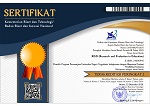Discrepancies in assessing undergraduates' pragmatics learning
DOI:
https://doi.org/10.21831/reid.v3i2.14487Keywords:
Authentic assessment, program evaluation, pragmatics, Rasch ModelAbstract
The purpose of this research was to reveal the level of implementation of authentic assessment in the pragmatics course at the English Education Department of a university. Discrepancy Evaluation Model (DEM) was used. The instruments were questionnaire, documentation, and observation. The result of the research shows that respectively, the effectiveness of definition, installation, process, and production stages in logits are -0.06, -0.14, 0.45, and 0.02 on its aspect of the assessment methods' effectiveness in uncovering students' ability. Such values indicate that the level of implementation fell respectively into "˜very high','high', "˜low', and "˜very low' categories. The students' success rate is in "˜very high' category with the average score of 3.22. However, the overall implementation of the authentic assessment fell into a "˜low' category with the average score of 0.06. Discrepancies leading to such a low implementation are the unavailability of the assessment scheme, that of scoring rubric, minimal (only 54.54%) diversification of assessment methods, infrequency of the lecturer's feedback on the students' academic achievement, and the non-use of portfolio assessment.
References
Bentley, Y., & Warwick, S. (2013). An investigation into students' perceptions of group assignments. Journal of Pedagogic Development, 3(3), 11–19. Retrieved from https://journals.beds.ac.uk/ojs/index.php/jpd/article/view/199/310
Brown, S. A., & Glasner, A. (1999). Assessment matters in higher education: Choosing and using diverse approaches. Buckingham: Society for Research into Higher Education & Open University Press.
Christie, M. F., Grainger, P., Dahlgren, R., Call, K., Heck, D., & Simon, S. (2015). Improving the quality of assessment grading tools in Master of Education courses: A comparative case study in the Scholarship of Teaching and Learning. Journal of the Scholarship of Teaching and Learning, 15(5), 22–35. https://doi.org/10.14434/josotl.v15i5.13783
DiRanna, K., Osmundson, E., Topps, J., Barakos, L., Gearhart, M., Cerwin, K., ... Strang, C. (2008). Assessment-centered teaching: A reflective practice. Thousand Oaks, CA: Corwin Press.
Fernandes, H. J. X. (1984). Evaluation of educational programs. Jakarta: National Education Planning Evaluation and Curriculum Development.
Fitzpatrick, J. L., Sanders, J. R., & Worthen, B. R. (2011). Program evaluation: Alternative approaches and practical guidelines. Boston, MA: Pearson Education.
Fook, C. Y., & Sidhu, G. K. (2010). Authentic assessment and pedagogical strategies in higher education. Journal of Social Sciences, 6(2), 153–161. https://doi.org/10.3844/jssp.2010.153.161
Fry, H., Ketteridge, S., & Marshall, S. (2009). A handbook for teaching and learning in higher education: Enhancing academic practice (3rd ed.). New York, NY: Routledge.
Irons, A. (2008). Enhancing learning through formative assessment and feedback. London: Routledge.
Joughin, G. (Ed.). (2009). Assessment, learning and judgement in higher education: A critical review. Wollongong: Springer. https://doi.org/10.1007/978-1-4020-8905-3_2
Mardapi, D. (2008). Teknik penyusunan instrumen tes dan nontes. Yogyakarta: Mitra Cendekia.
Mardapi, D. (2012). Pengukuran penilaian dan evaluasi pendidikan. Yogyakarta: Nuha Medika.
McNamara, T. F., & Roever, C. (2006). Language testing: The social dimension. Oxford: Blackwell Publishing.
Miles, M. B., Huberman, A. M., & Saldaña, J. (2014). Qualitative data analysis: A methods sourcebook (3rd ed.). Thousand Oaks, CA: Sage.
Suarta, I. M., Hardika, N. S., Sanjaya, I. G. N., & Arjana, I. W. B. (2015). Model authentic self-assessment dalam pengembangan employability skills mahasiswa pendidikan tinggi vokasi. Jurnal Penelitian Dan Evaluasi Pendidikan, 19(1), 46–57. https://doi.org/10.21831/pep.v19i1.4555
Sumintono, B., & Widhiarso, W. (2015). Aplikasi pemodelan Rasch pada asesmen pendidikan. Cimahi: Trim Komunikata.
Tim Kurikulum dan Pembelajaran. (2014). Buku kurikulum pendidikan tinggi. Jakarta: Directorate of Learning and Student Affairs, Directorate General of Higher Education, Ministry of Education and Culture.
Universitas Negeri Yogyakarta. (2014). Buku peraturan akademik Universitas Negeri Yogyakarta (Revised ed.). Yogyakarta: UNY Press.
Yule, G. (1996). Pragmatics. Oxford: Oxford University Press.
Yusuf, A. M. (2015). Asesmen dan evaluasi pendidikan: Pilar penyedia informasi dan kegiatan pengendalian mutu pendidikan. Jakarta: Prenada Media Group.Downloads
Published
How to Cite
Issue
Section
Citation Check
License
The authors submitting a manuscript to this journal agree that, if accepted for publication, copyright publishing of the submission shall be assigned to REID (Research and Evaluation in Education). However, even though the journal asks for a copyright transfer, the authors retain (or are granted back) significant scholarly rights.
The copyright transfer agreement form can be downloaded here: [REID Copyright Transfer Agreement Form]
The copyright form should be signed originally and sent to the Editorial Office through email to reid.ppsuny@uny.ac.id

REID (Research and Evaluation in Education) by http://journal.uny.ac.id/index.php/reid is licensed under a Creative Commons Attribution-ShareAlike 4.0 International License.







.png)





